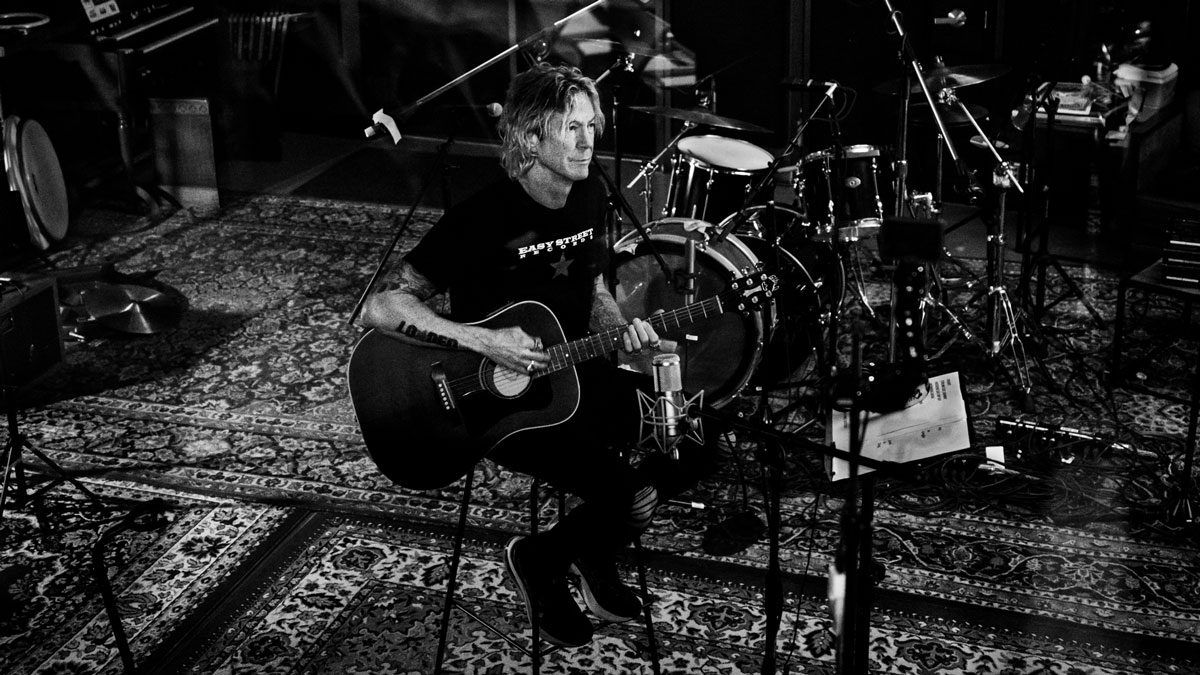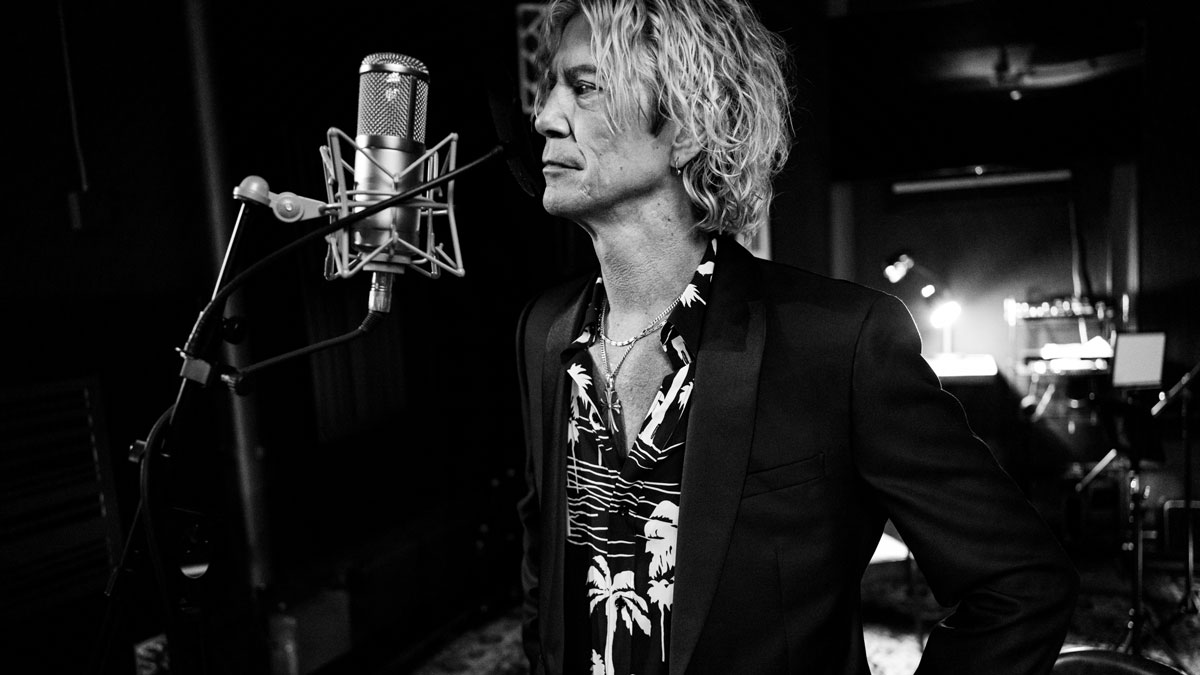Duff McKagan: “I discovered my acoustic guitar as a refuge during Covid. It lessens the panic attacks”
The Guns N’ Roses bassist and songwriter speaks candidly about how trading the bottle for playing acoustic has helped his panic attack and mental health struggles

All the latest guitar news, interviews, lessons, reviews, deals and more, direct to your inbox!
You are now subscribed
Your newsletter sign-up was successful
In tandem with Mental Health Awareness Month (May), Duff McKagan has released a three-song EP, This Is The Song, his first solo project since 2019’s Tenderness.
McKagan wrote the title track while in the throes of a panic attack, an often debilitating and misunderstood condition he has struggled with since age 16. The song was released with an accompanying video and written message, and an additional video message about mental health.
Guitar World connected with McKagan to discuss This Is The Song. [Responses have been edited for space.]
Let’s begin with the guitars you used to write and record This Is The Song.
“I have a 1989 Guild, not sure what model it is. I have two others, one I used in the Patience video in ’88, both the same model Guild. That’s what I mostly record on in my studio in Seattle, acoustic guitar-wise.
“I used a variety of basses. My two signature Fender models. I use the newer model with the drop D thing and I’ve kept the same strings on there forever, so I’ve got a really cool sound that I like, especially for more acoustic recordings. I have a Burny Les Paul, probably from 2000, that I just love. I’ve got a Junior that Slash gave me that I use.
“As far as writing songs, I have a Fender acoustic in my living room that I always use whenever I sit down. I just put it on my lap. I think that’s the key with writing songs – always have a guitar in your hand. In this process I taught myself how to fingerpick. [During] Covid, I had time to figure out a bunch of stuff bass-playing-wise and guitar playing. I really studied.”
All the latest guitar news, interviews, lessons, reviews, deals and more, direct to your inbox!
In keeping with its message and purpose, This Is The Song is obviously raw. How did you ‘revisit’ the original emotions while tracking it?
“I was actually having a panic attack, and they come out of nowhere. I was in bed with my wife. Sometimes I don’t want to alarm her when I’m having a panic attack, so I went downstairs and what I found was that when I picked up the acoustic guitar, put it on my lap, and I started playing, I start singing a melody, and that song came.
“I record all my demos on my GarageBand. I just use the microphone, and I have a million little demos, so I had a demo of this song and I didn’t have to go there emotionally. I had the lyrics written, so it’s easy for me to emote that feeling, as it comes from a place of truth.”
What are your memories of your first panic attack?
My first panic attack was in my mom’s house. I was 16, I was in the shower, and I thought there was an earthquake, because the shower dropped three feet and I literally went down to my knees
“Panic attacks aren’t like I hear people say, ‘I’m anxious.’ It’s not that or ‘nervousness’. I work out every day; you can’t be physically strong and just ‘get over it’. It has nothing to do with that. I’m wired a little bit differently, to put it quite frankly, and I’ll just spin out and go into overdrive, unbeknownst to me, and it’ll happen in the craziest places when there’s nothing even happening.
“I had one getting a massage once. Everything was great with my family, my wife, my kids, and my band. There’s nothing you can pinpoint like, ‘Ah, this is why it’s happening.’ If my receptors take a little left turn, it just happens. It’s like a cut that keeps reopening. You have no control over it.
“My first panic attack was in my mom’s house. I was 16, I was in the shower, and I thought there was an earthquake, because the shower dropped three feet and I literally went down to my knees. I come crawling out of the shower and I realize nothing’s upside-down or turned around. It was me. That realization that first time was like I just thought I’d gone crazy. My mom took me to the emergency room, and some psychologist in the emergency room figured it out. They gave me some drugs to calm me down.
“I thought I was alone for the first year-and-a-half or two years of having these, which is really not cool to feel like you’re all alone. A friend of a friend had heard about it, and she read this book and said, ‘Millions of people get these panic attacks.’ This is back in the early ’80s or late ’70s, and to hear that other people had it was a big weight off my back. I didn’t feel so all alone, and that was something.”
Have the frequency and intensity changed over the years? What are some of your coping skills?
“The frequency and intensity hasn’t really changed. Coping skills: crossword puzzles, playing guitar, I’ve done all kinds of stuff, drinking water and eating almonds – something to keep my airwaves going. It sounds crazy, but it’s a thing. They aren’t even skills. I just do whatever I can.
“I have professional help. I talk to a doctor once a week and just go through stuff, and it’s nice to be able to do that. I’ve got great insurance, and so, you know, the mental health industry. I’ve utilized it and it’s been great for me.”
In the accompanying press release, you state, “I have thankfully found my acoustic guitar as a refuge.” Tell us more about the healing aspects of playing guitar.
I discovered alcohol as a coping mechanism not long after I first started having panic attacks. It makes total sense why. My band was taking off and I was getting panic attacks. I had no outside help. I had nothing except for a bottle
“I think I discovered my acoustic guitar as a refuge due to Covid. A lot of things happened during Covid where the world just stood still and you discovered a lot of things. I think we all did. I discovered that my acoustic guitar is a serious refuge to stop the panic attack, lessen it. I’ve got a few tools, but that one is my favorite right now.”
There was a time in your life when coping came in the form of self-medication.
“A lot of people know me for being the ‘king of beers’ – being sauced on sauce in my 20s. I discovered alcohol as a coping mechanism not long after I first started having panic attacks. It makes total sense why. My band was taking off and I was getting panic attacks. I had no outside help. I had nothing except for a bottle.
“Once I got sober, that was one of the first thoughts I had in the hospital, the different reasons why I had to get sober if I want to live. And then, of course, how am I going to deal with panic attacks? What the fuck? How does a person do this?
“I don’t want anybody to think I am constantly on the verge of a panic attack. I get these pings, you lose your breath, and sometimes it goes all the way to a panic attack. I’m pretty good at stopping them. I get pings, like, once a week, and I get a panic attack a few times a year now, so it’s not absolutely terrible. It is what it is. I’m so used to it.
“I’ve tried to talk about it before, just to help others, because being sober, it really helps to be of service to others. And that helps you in sobriety as well. Mental health is a huge part because I was just self-medicating. A lot of alcohol [and] opiate use – you’re medicating something else. Mine were just panic attacks.
“I’ve had some things with depression that came in the last year and later part of my life. It’s not fun to have, and again, it’s nothing you can do to stop it. It’s not like your strength or your willpower or ‘I got no reason to be depressed.’ It has nothing to do with that. It’s a medical condition. Now I understand it, and I can talk about it and help others.”

As with many mental health conditions, panic can cause us to isolate. How does the creative process help keep you from doing so?
“In my case, panic attacks have never caused me to isolate. But panic disorder is such a varied monster. It gives a wide variety of things a name, so my attacks can look completely different than another person.”
Those of us battling mental health issues often find comfort through community – support groups, for example. Trying to explain to those who don’t know is another matter. What is your message to readers with lived experience and without?
“I wrote about this a bit in my statement on the EP. I said, ‘If you’ve experienced this stuff, then you’re not alone.’ I’m here to say, I’m raising my hand up. If you haven’t experienced this stuff, consider yourself blessed, man. I am almost jealous! You should count yourself lucky for that.
“To this day, I don’t know how to explain it for someone that doesn’t really want to know, or thinks you’re weak, or something like that. I kickbox in a ring. It’s not a thing with how macho you are. I’m an A-type personality. I strive to be the best in everything I do. [Panic] is just a thing I got, a cut that reopens and you put a Band-Aid on it. Hopefully it goes away forever, but if it opens back up, you deal with it then. Nothing more, nothing less.”
Resources
Alison Richter is a seasoned journalist who interviews musicians, producers, engineers, and other industry professionals, and covers mental health issues for GuitarWorld.com. Writing credits include a wide range of publications, including GuitarWorld.com, MusicRadar.com, Bass Player, TNAG Connoisseur, Reverb, Music Industry News, Acoustic, Drummer, Guitar.com, Gearphoria, She Shreds, Guitar Girl, and Collectible Guitar.
